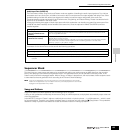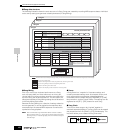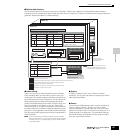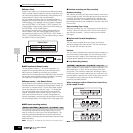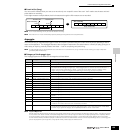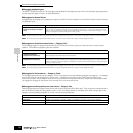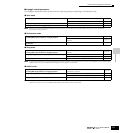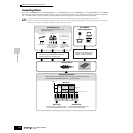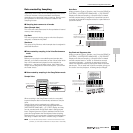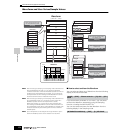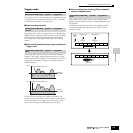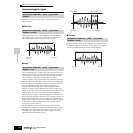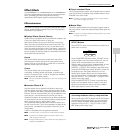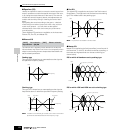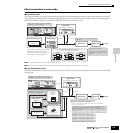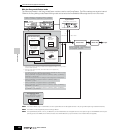
Internal Structure (System Overview)
173
Owner’s Manual
Basic Structure
Data created by Sampling
Regardless of the mode, the raw Sampled data is the same,
of course. However, various parameters are different,
depending on the particular mode or settings. Briefly, here is
an explanation of what kinds of data are created in the
Sampling function.
● Sampling data common to all modes
Wave (Sample data)
This is the raw audio data stored in this synthesizer’s internal
memory when sampling.
Key Bank
The note range and velocity range to which the Sample is
assigned, is called the Key Bank.
Waveform
The group of Key Banks to which sample data is assigned is
called the Waveform.
● Data created by sampling in the Voice/Performance
mode
User Voice
Before you can play the recorded/imported sample data
(Waves), you’ll need to save them as User Voices, after which
they can be selected and played from the keyboard or
sequencer — the same as other Voices. Also, these User
Voices can be assigned as Performance parts – just as with
the Preset Voices.
● Data created by sampling in the Song/Pattern mode
Sample Voice
When sampling in the Song/Pattern mode, the recorded/
imported sample data is automatically stored as a Sample
Voice.
Sample Voices can be assigned to the Mixing parts
corresponding to the track which was assigned from the
[INTEGRATED SAMPLING] → [F1] DEST display, and they
can be sounded while Song/Pattern data is being played
back. Sample Voices are original, dedicated Voices for the
particular Song/Pattern that was selected when sampling.
Because of this, you cannot take a Sample Voice belonging to
one Song or Pattern and use it in another Song or Pattern.
n
You cannot select Sample Voices in the Voice or Performance mode.
(However, you CAN select the Wave of the Sample Voice in Voice Edit.)
Note Data
When you set the Type to “Sample + note” from the [SONG] or
[PATTERN] → [INTEGRATED SAMPLING] → [F2] SOURCE
display and execute Sampling, a Sample Voice is created
and the sampled wave is assigned to a specified note and
recorded as simple MIDI sequence data to a specified track
(as shown below).
Key Bank and Sequence data
When you set the Type to “Sample + seq” from the [SONG] or
[PATTERN] → [INTEGRATED SAMPLING] → [F2] SOURCE
display and execute Sampling, a Sample Voice is created
and the sampled wave is “sliced” or divided into several
component samples — and each is assigned to specific
notes, with sequence data for playing the notes to recreate
the sample. This is useful with rhythmic samples, giving you
fine control over the playback, including tempo changes.
Song or Pattern
Sampling
Track 1
Track 2
Track 3
Track 16
Specify the track.
Record to create a
Sample Voice.
Sample
Assign the Sample to a
specified key (note) to
create a Sample Voice.
Sequence data
Sample
Slice the Sample and
assign the sliced Sample
to specified keys (notes)
to create a Sample Voice.
Sequence data



